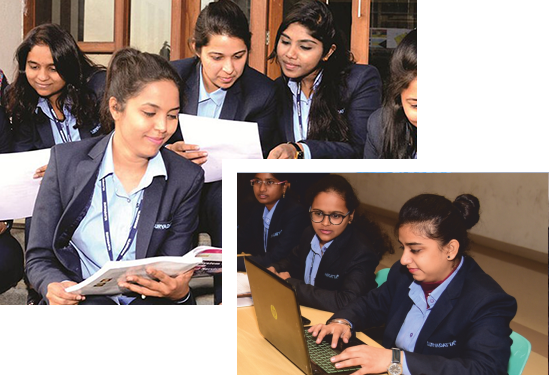Ph.D. in Management

About the Course
The Doctoral Programme in Management is designed to prepare students for impactful careers in research and teaching within academic institutions and organizations.
This rigorous doctoral program caters to high-achieving professionals who seek to enhance their expertise through original research. The program encourages innovative thinking, enabling scholars to explore new perspectives and conduct in-depth research on real-world business problems. Participants are empowered to apply their findings directly within their professional environments, driving measurable improvements and strategic outcomes in their organizations and beyond.

Course Overview

University Affiliation
Savitribai Phule University (SPPU)

Eligibility
Eligibility & Guidelines for PhD degree: Click here

Duration of Program
a) Ph.D. programme shall be for a minimum duration of three years, including course work and a maximum of six years.
b) Extension beyond the above limits will be governed by the relevant clauses as stipulated in the Statute / Ordinance of the SPPU
c) The Women candidates and Persons with Disability (more than 40% disability) may be allowed a relaxation of two years within the maximum duration.

Apply Now
Specialization Offered
- Bachelor of Hotel Management (BHM)
- Bachelor of Hotel Management and Catering Technology (BHMCT)
- Bachelor of Hotel Management (BHM)
- Bachelor of Tourism and Travel Management
- Bachelor of Hotel Management (BHM)
- Bachelor of Hotel Management and Catering Technology (BHMCT)
- Bachelor of Hotel Management (BHM)
- Bachelor of Tourism and Travel Management
- Bachelor of Hotel Management (BHM)
- Bachelor of Hotel Management and Catering Technology (BHMCT)
- Bachelor of Hotel Management (BHM)
- Bachelor of Tourism and Travel Management
PhD Course Work
- Ph.D. course work shall be a minimum of 08 credits and a maximum of 16 credits
- The course work shall be treated as prerequisite for Ph.D. preparation.
- A minimum of four credits shall be assigned to one or more courses on Research Methodology which could cover areas such as quantitative methods, computer applications, research ethics and review of published research in the relevant field, training, field work, etc.
- All courses prescribed for Ph.D. course work shall be in conformity with the credit hour instructional requirement and shall specify content, instructional and assessment methods. They shall be duly approved by the authorized academic bodies.
- The Department where the scholar pursues his/her research shall prescribe the course(s) to him/her based on the recommendations of the Research Advisory Committee of the research scholar.
- All candidates admitted to the Ph.D. programmes shall be required to complete the course work prescribed by the Department during the initial one or two semesters.
- Candidates already holding M. Phil. degree and admitted to the Ph.D. programme, or those who have already completed the course work in M.Phil. and have been permitted to proceed to the Ph.D. in integrated course, may be exempted by the Department from the Ph.D. course work. All other candidates admitted to the Ph.D. programme shall be required to complete the Ph.D. course work prescribed by the Department.
- Grades in the course work, including research methodology courses shall be finalized after a combined assessment by the Research Advisory Committee and the Department and the final grades shall be communicated to the Institution/College.
For more details: Click here

Research Advisory Committee: There shall be a Research Advisory Committee for each Ph.D. scholar. The Research Supervisor of the scholar shall be the Convener of this Committee.
Responsibilities of the Research Advisory Committee:
- To review the research proposal and finalize the topic of research
- To guide the research scholar to develop the study design and methodology of research and identify the course(s) that he/she may have to do.
- To periodically review and assist in the progress of the research work of the research scholar.
- A research scholar shall appear before the Research Advisory Committee once in six months to make a presentation of the progress of his/her work for evaluation and further guidance.
- The six monthly progress reports shall be submitted by the Research Advisory Committee to the Research Centre with a copy to the research scholar.
- In case the progress of the research scholar is unsatisfactory, the Research Advisory Committee shall record the reasons for the same and suggest corrective measures. If the research scholar fails to implement these corrective measures, the Research Advisory Committee may recommend to the Research Centre with specific reasons for cancellation of the registration of the research scholar.
Semester I:
- General English
- General Principles of Political Science
- General Principles of Economics
- General Principles of Sociology
Semester II:
- English for Law
- Political Theories
- Macro Economics, Policies, and Practice
- Theoretical Perspectives of Sociology
Semester III:
- Legal Language and Legal Reasoning
- Public Policy and Public Administration
- Theories of Development and Indian Economy
- Society in India
Semester IV:
- Law and Literature
- International Relations
- Law and Economics
- Social Research Methods
Semester V:
- Legal and Constitutional History
- Family Law I
- Law of Contract I
- Law of Crimes
- Optional Subject 1 (e.g., Health and Food Law, Equity and Trust Law, etc.)
Semester VI:
- Constitutional Law I
- Family Law II
- Law of Contract II
- Tort and Consumer Protection Law
- Optional Subject 2 (e.g., Media and Law, Banking and Insurance Law, etc.)
Semester VII:
- Constitutional Law II
- Property Law and Easement
- Public International Law
- Environmental Law
- Optional Subject 3 (e.g., Human Rights Law and Practice, International Economic Law, etc.)
Semester VIII:
- Labour and Industrial Law
- Jurisprudence
- Administrative Law
- Company Law
- Optional Subject 4 (e.g., Gender Justice and Feminist Jurisprudence, International Refugee Law, etc.)
Semester IX:
- Code of Civil Procedure and Limitation Act
- Criminal Procedure Code, Juvenile Justice Act, and Probation of Offenders Act
- Law of Evidence
- Drafting, Pleading, and Conveyancing
- Optional Subject 5 (e.g., Interpretation of Statutes, Land Laws, etc.)
Semester X:
- Legal Ethics and Professional Accounting System
- Alternate Dispute Resolution System
- Moot Court Exercise and Internship
- Optional Subject 6 (e.g., Law of Taxation, Cooperative Law, etc.)
Course Curriculum
- Strategic Event Management
- Event Sponsorship and Fundraising
- Legal Aspects of Event Management
- Advanced Event Technologies
- International Event Management
Semester I:
- General English
- General Principles of Political Science
- General Principles of Economics
- General Principles of Sociology
Semester II:
- English for Law
- Political Theories
- Macro Economics, Policies, and Practice
- Theoretical Perspectives of Sociology
Semester III:
- Legal Language and Legal Reasoning
- Public Policy and Public Administration
- Theories of Development and Indian Economy
- Society in India
Semester IV:
- Law and Literature
- International Relations
- Law and Economics
- Social Research Methods
Semester V:
- Legal and Constitutional History
- Family Law I
- Law of Contract I
- Law of Crimes
- Optional Subject 1 (e.g., Health and Food Law, Equity and Trust Law, etc.)
Semester VI:
- Constitutional Law I
- Family Law II
- Law of Contract II
- Tort and Consumer Protection Law
- Optional Subject 2 (e.g., Media and Law, Banking and Insurance Law, etc.)
Semester VII:
- Constitutional Law II
- Property Law and Easement
- Public International Law
- Environmental Law
- Optional Subject 3 (e.g., Human Rights Law and Practice, International Economic Law, etc.)
Semester VIII:
- Labour and Industrial Law
- Jurisprudence
- Administrative Law
- Company Law
- Optional Subject 4 (e.g., Gender Justice and Feminist Jurisprudence, International Refugee Law, etc.)
Semester IX:
- Code of Civil Procedure and Limitation Act
- Criminal Procedure Code, Juvenile Justice Act, and Probation of Offenders Act
- Law of Evidence
- Drafting, Pleading, and Conveyancing
- Optional Subject 5 (e.g., Interpretation of Statutes, Land Laws, etc.)
Semester X:
- Legal Ethics and Professional Accounting System
- Alternate Dispute Resolution System
- Moot Court Exercise and Internship
- Optional Subject 6 (e.g., Law of Taxation, Cooperative Law, etc.)

Student Testimonials






I had a great experience at Suryadatta Institute of Fashion technology as there is no other right place where a person can learn from scratch and be best at it.
I have grown so much during my course with the help of faculties and the environment. The college is so encouraging and gives amazing opportunities for the students to explore and shape their career. We are always motivated to do our best.

FAQ's
Suryadatta College of Hospitality Management & Travel Tourism (SCHMTT) is a leading institute located in Pune, NAAC accredited ,ISO 9001: 2015 certified, approved by DE/DTE Maharashtra, India that offers various UGC APRROVED undergraduate, postgraduate , diploma and vocational courses in hospitality management and travel tourism.
Suryadatta College of Hospitality Management & Travel Tourism (SCHMTT) offers courses such as
- Bachelor of Science in Hospitality Studies (B.Sc HS)- SPPU
- Bachelor of Science in Hospitality Studies (B.Sc HS)- KKSU
- Master of Science in Hospitality Studies (M.Sc HS )- KKSU
- One year diploma in Hospitality Studies [DHS]- YCMOU
- Two year diploma in Hospitality Studies [DHS]-[YCMOU 11 TH AND 12 TH – HSVC-MCVC-[Maharashtra Vocational Board]
Bachelor of Science in Hospitality Studies (B.Sc HS)- SPPU- 45 % For Open Category Marks AND For Backward Category -40 %
Bachelor of Science in Hospitality Studies (B.Sc HS)- KKSU- 12 TH PASS
Master of Science in Hospitality Studies (M.Sc HS )- KKSU- 12 TH PASS
One year diploma in Hospitality Studies [DHS]- YCMOU-12 TH PASS
Two year diploma in Hospitality Studies [DHS]-[YCMOU-12 TH PASS 11 TH AND 12 TH – HSVC-MCVC-[Maharashtra Vocational Board]-10 TH PASS
For updated fee structure please visit – https://www.schmtt.org/contact/
Yes, Suryadatta College of Hospitality Management & Travel Tourism (SCHMTT) provides hostel facilities for both boys and girls. The hostel fee is separate from the course fee and varies depending on the type of room chosen by the student.
Suryadatta College of Hospitality Management & Travel Tourism (SCHMTT) has a dedicated placement cell that helps students secure jobs in reputed hotels, airlines, Catering Units, Budget Hotels fast food units and Tours AND Travel Agencies. The institute gives 100 % placement and industrial Training assistance locally and globally.
Request course information by
submitting your enquiry
Our Blog
- All Posts
- Blog
- SCPHR
- SNS



